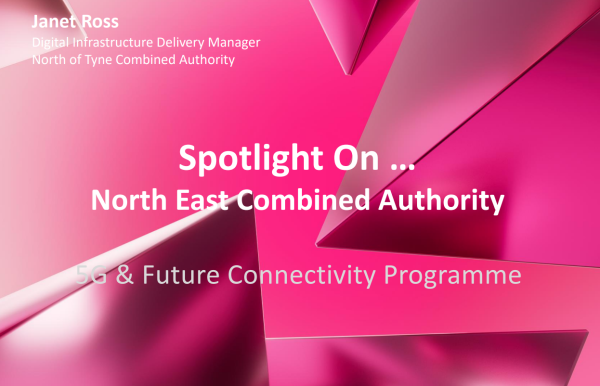
North East
Home to the smartest city in the UK and the fastest broadband speed in England
The region’s IT and digital sector is estimated to be worth an estimated £2bn to the North East England economy and is supported by an array of specialist support clusters and networks. It also boasts the highest proportion of computer science students in the UK. While Newcastle was named the smartest UK city in 2021, Sunderland is nationally heralded as a trailblazer for their work around neutral hosting and is deploying a city-owned 5G network for business and public services applications.

The North East 5GIR Cluster Presentation
The North East Combined Authority: 5G & Future Connectivity Programme
Technologies & trends
The region boasts expertise and capabilities in a number of key telecom fields. Learn more about the relevant technologies.
The potential benefits of 5G, future wireless generations and full-fibre digital connectivity can only be realised if we have confidence in the resilience of our infrastructure.
CyberNorth is the cyber security cluster for North East England. Through supporting the growth and development of cyber security in the region, they enable the North East to operate competitively and with a united profile.
The Centre for Cyber Security and Resilience is a Newcastle University Centre of Research Excellence which collaborates across faculties to conduct research and innovate in cyber security and resilience, including looking at key emergent systems and supporting individuals and society to guard safety, progress and prosperity. Similarly the Northumbria Cyber Security Research Group is a cross-faculty, multi-disciplinary group which combines technical research on biometric encryption, wireless sensor networks, web security protocols, and image recognition, with human-centred work on usable security, privacy, trust and behaviour change.

Wireless networking is experiencing a period of exciting change with the development of new generations from 5G to 6G, WiFi 6 and 7, offering new use cases and business cases that extend far beyond just faster speeds.
The region has been home to a number of 5G research projects, including 5G CAL and ORanGAN. More broadly, Sunderland has a progressive digital strategy and is working with BAI Communications to deliver city-wide 5G connectivity on a neutral host model. They are also encouraging innovation and entrepreneurship through a dedicated IoT and 5G accelerator programme.

Core networks are critical infrastructure and new digital technologies and trends have the potential to disrupt and transform, ensuring capabilities, resilience and performance can meet emerging and future needs.

Non-terrestrial networking (NTN) refers to any network that involves space or airborne elements, inclduing satellite communication networks, high-altitude platform systems (HAPS) and air-to-ground networks.
The North East Satellite Applications Centre of Excellence offers opportunities and partnerships to unlock market opportunities within the North East of the UK that benefit local and national economies. The County Durham centre also houses one of the Satellite Applications Catapult's six Space Enterprise Clusters, providing users with access to the latest collaborative technology, resources and expertise.

Artificial Intelligence (AI) is disrupting industry on a broad scale and the telecoms sector is no exception, with Valuates projecting that the global AI in telecoms market size will reach $14.99B by 2027, up from $11.89B in 2020.
The region's universities are all conducting work in the AI space. Northumbria University's Artificial Intelligence and Digital Technologies research cluster supports interdisciplinary research in AI, Machine Learning, intelligent systems and digital technologies to solve real-world problems. In 2019, it became an Academic Centre of excellence in Cyber Security Research, one of only 19 UK institutes to receive this recognition.
While Dstl (Defence Science and Technology Laboratory) Newcastle was announced in 2022 and will carry out AI and data science related research to help defence, turn data into information advantage, and to accelerate the responsible and ethical adoption of AI across defence.

Network management systems can be a critical driver of business value in the telecom industry, facilitating improved customer experience, optimised infrastructure operations and management of threats.

From batteries and sensors to antennas and lasers, the telecoms industry makes use of a broad range of materials and components such as copper, aluminium, ceramics and silicon, demonstrating diversification and innovation in the supply chain.
In Summer 2022, The North East Advanced Material Electronics cluster was formally launched by local companies who produce everything from optical modulators for satellite and aerospace communications to compound semiconductors, with “a mission to highlight and promote the region as a centre of excellence for advanced compound semiconductor technology design and manufacture”. The cluster believes it will contribute £447m gross value added to the region by 2026, with the potential to create and support around 4,500 jobs.
The ORanGaN project is developing a sovereign UK supply chain for radio frequency gallium nitride (RF-GaN) devices, with manufacturing taking place near Newcastle.

Optical communication refers to the use of light to carry a communication signal to the remote end, instead of an electrical current.
Northumbria University's Optical Communications Research Group specialises in visible light communications, non-linear control systems and optical sensor research. Covering everything from pioneering work on visible light communications and organic visible light communications for data communications, to the design and fabrication of fibre Bragg grating devices for sensing.

Diversification of the telecoms supply chain is ultimately about choice, a desire to broaden the choice of equipment and solution providers in the sector-driven by commercial, technical and geopolitical factors.
The region is home to INEX, a commercial unit of Newcastle University, who is leading the ORanGaN project, part of the DSIT funded Future RAN Competition.

Deploying 5G in Places
We've spoken to local authorities up and down the UK, to hear first hand how they've approached digital infrastructure and connectivity programmes. Designed to be both practical and pragmatic, we've collated insights, assets and guides that can be replicated and adapted to help you on your journey to 5G.
Discover some of the ways you can seize the opportunity and be better connected.
North East Combined Authority: 5G & Future Connectivity Programme
5G & Future Connectivity Programme presented by Janet Ross Digital Infrastructure Delivery Manager North of Tyne Combined Authority.












